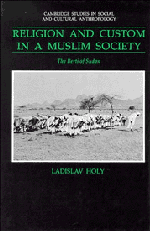Book contents
- Frontmatter
- Contents
- List of illustrations
- Preface and acknowledgements
- Introduction
- 1 The Berti and Islam
- 2 Men and women
- 3 Milk and water
- 4 Village and wilderness
- 5 Custom and religion
- 6 Life cycle
- 7 Circumcision
- 8 Blood and rain
- 9 Custom and superstition
- Glossary
- References
- Index
- Cambridge Studies in Social and Cultural Anthropology
2 - Men and women
Published online by Cambridge University Press: 27 August 2009
- Frontmatter
- Contents
- List of illustrations
- Preface and acknowledgements
- Introduction
- 1 The Berti and Islam
- 2 Men and women
- 3 Milk and water
- 4 Village and wilderness
- 5 Custom and religion
- 6 Life cycle
- 7 Circumcision
- 8 Blood and rain
- 9 Custom and superstition
- Glossary
- References
- Index
- Cambridge Studies in Social and Cultural Anthropology
Summary
The model of gender relations explicitly expressed by Berti men is that of male dominance and female subordination. This is the model which is most forcefully asserted and most often invoked. It tallies well with the patrilineal ideology of the Berti and with their notions about kinship distance according to which kin related through men are seen as closer than the genealogically equidistant kin related through women.
The notions of the greater importance of men and lesser importance of women are expressed metaphorically in the often heard saying rājil giddām, mara warn (‘the man is in front, the woman behind’). This saying summarises what is seen as the appropriate form of women's deference towards men as well as the leadership role of men: it is often quoted by both men and women to explain and justify the fact that men make all major economic and political decisions and, in their roles as fathers, brothers and husbands, are charged with responsibility for the conduct and morality of women. It informs a great deal of everyday behaviour of men and women in public: when the husband and wife go together to the field, well or market, he walks in front and she follows a few paces behind or, more typically, the man rides a donkey and the woman follows on foot.
- Type
- Chapter
- Information
- Religion and Custom in a Muslim SocietyThe Berti of Sudan, pp. 47 - 65Publisher: Cambridge University PressPrint publication year: 1991



